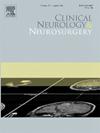Spirituality and neurosurgery: A salutogenic current perspective
IF 1.8
4区 医学
Q3 CLINICAL NEUROLOGY
引用次数: 0
Abstract
Aim
This systematic review aims to determine how spirituality influences prehabilitation and post-operative patient outcomes along with their coping mechanisms while undergoing Neurosurgical intervention. We have endeavoured to explore the feasibility of safe integration of this concept into Neurosurgical care provision.
Method
A literature search was carried out and articles were retrieved from PubMed, Science Direct and Cochrane database using specific keywords. We identified a total of 381 studies that fit our criteria and were analysed using PRISMA guidelines.
Results
This review summarises evidence that spirituality significantly impacts multiple domains of neurosurgical patient care. Studies indicate that spirituality fosters meaning, hope, and comfort, aiding patients in coping with neurosurgical conditions like brain and spinal tumours. Patients with higher spirituality exhibited improved postoperative outcomes, including faster recovery, better quality of life, and greater healthcare satisfaction. The ethical necessity of addressing spiritual needs, particularly regarding end-of-life decisions and respecting cultural beliefs was also examined. Some types of spirituality measures showed more positive outcomes in patients than others. While a few studies found no association between quality of life and complementary spiritual therapies, trends have shifted. Neuroimaging research has identified potential neurobiological correlates of spiritual experiences in regions like the parietal lobe and prefrontal cortex. The World Health Organisation (WHO) now includes spirituality in the holistic approach to palliative care for terminal patients.
Conclusion
Current evidence suggests beneficial outcomes from utility of spirituality tools such as meditation, yoga, mantram repetition, exercise, and support groups. These can be safely integrated in provision of a salutogenic approach to improve overall outcome in patients undergoing neurosurgery. This is the first study to focus on spirituality in Neurosurgery aiming for holistic care provision across the globe. We believe that it is feasible to bring in a change to patient’s care balancing mind, body and spirit integrated with excellent Neurosurgical care.
灵性和神经外科:健康的当前观点
目的:本系统综述旨在确定在接受神经外科干预时,灵性如何影响患者的康复和术后预后以及他们的应对机制。我们已经努力探索将这一概念安全整合到神经外科护理提供的可行性。方法进行文献检索,使用特定关键词从PubMed、Science Direct和Cochrane数据库中检索文章。我们总共确定了381项符合我们标准的研究,并使用PRISMA指南进行了分析。结果本综述总结了精神性显著影响神经外科患者护理多个领域的证据。研究表明,精神可以培养意义、希望和安慰,帮助患者应对脑肿瘤和脊柱肿瘤等神经外科疾病。具有更高灵性的患者表现出更好的术后结果,包括更快的恢复、更好的生活质量和更高的医疗满意度。还审查了解决精神需要的伦理必要性,特别是关于临终决定和尊重文化信仰的必要性。某些类型的灵性测量在患者中显示出比其他类型更积极的结果。虽然一些研究发现生活质量和补充精神疗法之间没有联系,但趋势已经发生了变化。神经成像研究已经确定了顶叶和前额皮质等区域的精神体验的潜在神经生物学相关性。世界卫生组织(WHO)现在将灵性纳入临终病人姑息治疗的整体方法。结论:目前的证据表明,使用冥想、瑜伽、念咒、锻炼和支持团体等灵性工具会产生有益的结果。这些可以安全地整合在一起,提供一种有益健康的方法,以改善接受神经外科手术的患者的总体结果。这是第一个专注于精神神经外科的研究,旨在为全球提供整体护理。我们相信,结合优秀的神经外科护理,为患者的身心精神平衡护理带来改变是可行的。
本文章由计算机程序翻译,如有差异,请以英文原文为准。
求助全文
约1分钟内获得全文
求助全文
来源期刊

Clinical Neurology and Neurosurgery
医学-临床神经学
CiteScore
3.70
自引率
5.30%
发文量
358
审稿时长
46 days
期刊介绍:
Clinical Neurology and Neurosurgery is devoted to publishing papers and reports on the clinical aspects of neurology and neurosurgery. It is an international forum for papers of high scientific standard that are of interest to Neurologists and Neurosurgeons world-wide.
 求助内容:
求助内容: 应助结果提醒方式:
应助结果提醒方式:


